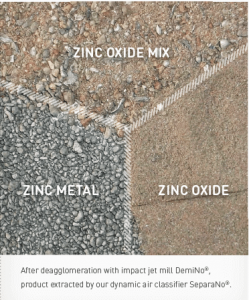To obtain a pure product which reduces wear and tear on industrial machinery like paper rollers or plastic extruders: selective grinding is the perfect solution. It is also an effective method to  purify contaminated powders in order to regain the valuable materials they contain. Using NOLL’s innovative classifying procedures, materials of different densities can be separated with ultra-high precision. The specific product characteristics and individual refinement objectives determine which processing systems are chosen for selective grinding: whether it’s DemiNo® and SeparaNo® and/or MultiNo®-M/S/M, the patented opposed jet mill for grinding, classifying and mixing on only one system. The machines can be connected in continuous, online operation according to process and product requirements. The result is highest product purity: valuable raw materials that can be re-directed into the productive cycles.
purify contaminated powders in order to regain the valuable materials they contain. Using NOLL’s innovative classifying procedures, materials of different densities can be separated with ultra-high precision. The specific product characteristics and individual refinement objectives determine which processing systems are chosen for selective grinding: whether it’s DemiNo® and SeparaNo® and/or MultiNo®-M/S/M, the patented opposed jet mill for grinding, classifying and mixing on only one system. The machines can be connected in continuous, online operation according to process and product requirements. The result is highest product purity: valuable raw materials that can be re-directed into the productive cycles.
Goals. Costly waste disposal? With intelligent processing, do without it! Selective grinding of contaminated material solves an important problem today: regaining precious raw materials in order to re-direct them into the productive cycle. Processing examples and equipment. The reduction of quartz in clay powders, the elimination of finest metallic contaminations (titanium dioxide) in ceramic glazes, or the extraction of zinc oxide from zinc metals. To regain aluminum from aluminum-plastic foils, the synthetic (1.0 g/cm3) and aluminum (3.5 g/cm3) have to be separated. In a first step, the material is deagglomerated and its particles rounded by impact whirl mill DemiNo®. The aluminum can then be extracted using the dynamic air classifier SeparaNo®. In a second step, the regained material is processed to powder, with optional further micronisation.
Goals. Product purity – by decreasing the amount of high-density, wear-and-tear materials like silicon or quartz (Mohs hardness 6.5) – as well as a specific grain spectrum..
Equipment. Specially designed for such difficult demands: DemiNo®, the patented impact whirl mill, is used for the deagglomeration up to Mohs hardness 9 and micronisation up to Mohs hardness 7 – including easily depositing and gluey substances. It can be flexibly equipped with a variety of impact elements (ceramic, cast and stainless steel, hard metal). With its rotational speed of only 120 m/s, it features low-energy consumption. In the first step of the reduction process, DemiNo® takes over the deagglomeration of the product. Our dynamic air classifier SeparaNo® then serves as fractionizing unit (until Mohs hardness 10), extracting the wear-and-tear components.
Processing example. The processing of clay powders which are used in a great variety of industries and technologies, for example in catalysts, oil binders or as fillers in the synthetics industry. The purity of the clay powders along with the defined, deagglomerated structure of nano particles <3000 nm is indispensable for the compact molding of high-quality synthetic components. It avoids high wear and tear of the extruder tools.
50% Regaining precious material using MultiNo®-M/S/M. Example nitride: we achieve a 50% waste reduction. The valuable raw material can be re-used for surface coating purposes.
More information: